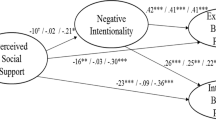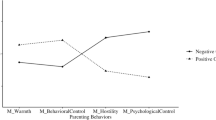Abstract
In the present cross-sectional study, we examined the combination profiles derived from latent profile analysis (LPA) using BIS/BAS as well as maternal parenting behavior as indicators in accounting for behavior problems in a sample of 801 Korean adolescents (406 females, 395 males). Furthermore, we examined whether the derived latent profiles demonstrate similarities across gender and behavior problems and latent profile characteristics were compared. For both female and male adolescents, a majority of the sample was classified in the ‘Sociable and Parental Support’ profile characterized by moderate BIS/BAS combined with maternal parental support and low psychological control and they demonstrated good adjustment. Significant difference in behavior problems was not found between male adolescents in the ‘Moderately Shy and Parental Control’ profile and the ‘Unsociable and Parental Indifference’ profile despite the heterogeneity in motivational system and maternal parenting behavior. For female adolescents, a combination of high BIS/BAS and high psychological control (‘High Shy and Parental Control’) was associated with significant behavior problems. However, female adolescents in the ‘Unsociable and Parental Monitoring’ profile did not exhibit significantly more behavior problems compared to females in the ‘Sociable and Parental Support’ profile. The present study indicates that the combination profile based on the motivational system and maternal parenting behavior differ depending on adolescent gender and that latent profile characteristics associated with more behavior problems also differ depending on gender.


Similar content being viewed by others
Data Availability
Data set is available upon request.
References
Aalsma, M. C., Liu, G. C., & Wiehe, S. E. (2011). The role of percieved parent monitoring and support on urban child and adolescent problem behavior. Community Mental Health Journal, 47, 61–66. https://doi.org/10.1007/s10597-009-9251-2.
Achenbach, T. M., & Rescorla, L. A. (2001). Manual for the ASEBA School-age Forms & Profiles. Burlington: University of Vermont, Research Center for Children, Youth, & Families.
Asendorpf, J. B. (1990). Beyond social withdrawal: Shyness, unsociability, and peer avoidance. Human Development, 33, 250–259.
Barber, B. K. (1996). Parental psychological control: Revisiting a neglected construct. Child Development, 67, 3296–3319.
Barber, B. K., Stolz, H. E., Olsen, J. A., Collins, W. A., & Burchinal, M. (2005). Parental support, psychological control, and behavioral control: Assessing relevance across time, culture, and method. Monographs of the Society for Research in Child Development, 70, i+v+vii+1-147.
Bares, C. B., Andrade, F., Delva, J., & Grogan-Kaylor, A. (2011). Personality and parenting processes associated with problem behaviors: A study of adolescents in Santiago, Chile. Social Work Research, 35, 227–240. https://doi.org/10.1093/swr/35.4.227.
Baumrind, D. (1968). Authoritarian vs. authoritative parental control. Adolescence, 3, 255–272.
Borden, L. A., Herman, K. C., Stormont, M., Goel, N., Darney, D., Reinke, W. M., & Webster-Stratton, C. (2014). Latent profile analysis of observed parenting behaviors in a clinic sample. Journal of Abnormal Child Psychology, 42(5), 731–742. https://doi.org/10.1007/s10802-013-9815-z.
Carver, C. S., & White, T. L. (1994). Behavioral inhibition, behavioral activation, and affective responses to impending reward and punishment: The BIS/BAS scales. Journal of Personality and Social Psychology, 67, 319–333. https://doi.org/10.1037/0022-3514.67.2.319.
Cascio, V. l., Guzzo, G., Pace, F., Pace, U., & Madonia, C. (2016). The relationship among parental and maternal psychological control, self-esteem, and indecisiveness across adolescent genders. Current Psychology, 35, 4567–4477. https://doi.org/10.1007/s12144-015-9315-0.
Cho, J. Y., (2010). Pathways from interparental conflict to adolescents’ problem behavior: Maternal support and control and quality of peer relationship effects (unpublished master’s thesis). Ewha Woman’s University.
Colder, C. R., & O’Connor, R. M. (2004). Gray’s reinforcement sensitivity model and child psychopathology: Laboratory and questionnaire assessment of the BAS and BIS. Journal of Abnormal Child Psychology, 32, 435–451. https://doi.org/10.1023/b:jacp.0000030296.54122.b6.
Coplan, R. J., Wilson, J., Frohlick, S. L., & Zelenski, J. (2006). A person-oriented analysis of behavioral inhibition and behavioral activation in children. Personality and Individual Differences, 41, 917–927. https://doi.org/10.1016/j.paid.2006.02.019.
Gray, J. A. (1970). The psychophysiological basis of introversion-extraversion. Behaviour Research and Therapy, 8, 249–266. https://doi.org/10.1016/0005-7967(70)90069-0.
He, Y., Yuan, K., Sun, L., & Bian, Y. (2019). A cross-lagged model of the link between parental psychological control and adolescent aggression. Journal of Adolescence, 74, 103–112. https://doi.org/10.1016/j.adolescence.2019.05.007.
Kim, H. A., & Chang, H. I. (2017). Independent and interactive effects of paternal positive parenting and child negative emotionality on children’s externalizing behavior problems. Korean Journal of Developmental Psychology, 31, 41–62.
Kim, K. H., & Kim, W. S. (2001). Korean-BAS/BIS scale. The Korean Journal of Health Psychology, 6, 19–37.
Kingsbury, A., Coplan, R. J., Weeks, M., & Rose-Krasnor, L. (2013). Covering all the BAS's: A closer look at the links between BIS, BAS, and socio-emotional functioning in childhood. Personality and Individual Differences, 55, 521–526. https://doi.org/10.1016/j.paid.2013.04.021.
Lan, X., & Wang, W. (2020). To be shy or avoidant? Exploring the longitudinal association between attachment and depressive symptoms among left-behind adolescents in rural China. Personality and Individual Differences, 155, 1–7. https://doi.org/10.1016/j.paid.2019.109634.
Li, M., Chen, J., Li, N., & Li, X. (2014). A twin study of problematic internet use: Its heritability and genetic association with effortful control. Twin Research and Human Genetics, 17, 279–287.
Mabbe, E., Soenens, B., Vansteenkiste, M., & Van Leeuwen, K. (2016). Do personality traits moderate relations between psychologically controlling parenting and problem behavior in adolescents? Journal of Personality, 84, 381–392. https://doi.org/10.1111/jopy.12166.
Müller, A., Claes, L., Wilderjans, T. F., & de Zwaan, M. (2014). Temperaments subtypes in treatment seeking obsess individuals: A latent profile analysis. European Eating Disorders Review, 220, 260–266. https://doi.org/10.1002/erv.2294.
Mumford, E. A., Liu, W., & Taylor, B. G. (2016). Parenting profiles and adolescent dating relationship abuse: Attitudes and experiences. Journal of Youth and Adolescence, 45, 959–972. https://doi.org/10.1007/s10964-016-0448-8.
Muthén, B. O. (2004). Latent variable analysis: Growth mixture modeling and related techniques for longitudinal data. In D. Kaplan (Ed.), Handbook of quantitative methodology for the social sciences (pp. 345–368). Newbury Park: Sage. https://doi.org/10.4135/9781412986311.n19.
Muthén, L. K., & Muthén, B. O. (2015). Mplus statistical analysis with latent variables. User’s guide. Los Angeles, CA: Muthén & Muthén.
Nelson, D. A., Hart, C. H., Yang, C., Olsen, J. A., & Jin, S. (2006). Aversive parenting in China: Associations with child physical and relational aggression. Child Development, 77, 554–572.
Nelson, L. J., Padilla-Walker, L. M., Christensen, K. J., Evans, C. A., & Carroll, J. S. (2011). Parenting in emerging adulthood: An examination of parenting clusters and correlates. Journal of Youth and Adolescence, 40, 730–743. https://doi.org/10.1007/s10964-010-9584-8.
Nylund, K. L., Asparouhov, T., & Muthén, B. O. (2007). Deciding on the number of classes in latent class analysis and growth mixture modeling: A Monte Carlo simulation study. Structural Equation Modeling, 14, 535–569. https://doi.org/10.1080/10705510701575396.
Oh, K. J., & Kim, Y. A. (2011). Korean version of youth self report. Seoul: Huno Consulting Inc..
Pagliaccio, D., Luking, K. R., Anokhin, A. P., Gotlib, I. H., Hayden, E. P., Olino, T. M., Peng, C. Z., Hajcak, G., & Barch, D. M. (2016). Revising the BIS/BAS scale to study development: Measurement invariance and normative effects of age and sex from childhood through adulthood. Psychological Assessment, 28, 429–442. https://doi.org/10.1037/pas0000186.
Pellerone, M., Tolini, G., & Polopoli, C. (2016). Parenting, identity development, internalizing symptoms, and alcohol use: A cross-sectional study in a group of Italian adolescents. Neuropsychiatric Disease and Treatment, 12, 1769–1778. https://doi.org/10.2147/NDT.S106791.
Petti, G. S., & Laird, R. D. (2002). Psychological control and monitoring in early adolescence: The role of parental involvement and earlier child adjustment. In B. K. Barber (Ed.), Intrusive parenting: How psychological control affects children and adolescents (pp. 97-123). Washington, DC: American Psychological Association. 10/1037/10422-004.
Ran, G., Zhang, Q., & Huang, H. (2018). Behavioral inhibition system and self-esteem as mediators between shyness and social anxiety. Psychiatry Research, 270, 568–573. https://doi.org/10.1016/j.psychres.2018.10.017.
Schaefer, E. S. (1965). Children’s reports of parental behavior: An inventory. Child Development, 36, 413–424. https://doi.org/10.2307/1126465.
Shek, D. T. L. (2007). A longitudinal study of perceived parental psychological control and psychological well-being in Chinese adolescents in Hong Kong. Journal of Clinical Psychology, 63, 1–22.
Slobodskaya, H. R. (2016). The contribution of reinforcement sensitivity to the personality-psychopathology hierarchical structure in childhood and adolescence. Journal of Abnormal Psychology, 125, 1067–1078. https://doi.org/10.1037/abn0000179.
Smetana, J. G., & Ahmad, I. (2018). Heterogeneity in perceptions of parenting among Arab refugee adolescents in Jordan. Child Development, 89, 1786–1802.
Stice, E., & Gonzales, N. (1998). Adolescent temperament moderates the relation of parenting to antisocial behavior and substance use. Journal of Adolescent Research, 13, 5–31. https://doi.org/10.1177/0743554898131002.
Struijs, S. Y., Lamers, F., Vroling, M. S., Roelofs, K., Spinhoven, P., & Penninx, B. W. J. H. (2017). Approach and avoidance tendencies in depression and anxiety disorders. Psychiatry Research, 256, 475–481. https://doi.org/10.1016/j.psychres.2017.07.010.
Torsheim, T., Sorlie, M., Olseth, A. R., & Bjornebekk, G. (2015). Environmental and temperamental correlates of alcohol user patterns in grade 7 students. Nordic Studies on Alcohol and Drugs, 32, 605–621. https://doi.org/10.1515/nsad-2016-0057.
Van Zalk, N., & Kerr, M. (2011). Shy adolescents’ perceptions of parents’ psychological control and emotional warmth: Examining bidirectional links. Merrill-Palmer Quarterly, 57, 375–401. https://doi.org/10.1353/mpq.2011.0021.
Zhang, W., Wei, X., Ji, L., Chen, L., & Deater-Deckard, K. (2017). Reconsidering parenting in Chinese culture: Subtypes, stability, and change of maternal parenting style during early adolescence. Journal of Youth and Adolescence, 46, 1117–1136. https://doi.org/10.1007/s10964-017-0664-x.
Zhao, W., Xu, F., Ding, W., Song, Y., & Zhao, Q. (2019). The relationship between sensation seeking and tobacco and alcohol use among junior high school students: The regulatory effect of parental psychological control. Frontiers in Psychology, 10, 2022. https://doi.org/10.3389/fpsyg.2019.02022.
Code Availability
Not applicable.
Funding
This research was supported by a grant awarded to the first author by Inha University (#62974–01).
Author information
Authors and Affiliations
Contributions
Ji Young Choi: Conceptualization, Methodology, Formal analysis, Writing-original draft preparation, Writing-review & editing. Soo Hyun Park: Conceptualization, Writing-original draft preparation, Writing-review & editing. Jiyeon Lee: Data curation, Project administration, Resources, Methodology.
Corresponding author
Ethics declarations
Ethics Approval
The study was approved by the authors’ institutional review board and was performed in accordance with the ethical standards as laid down in the 1964 Declaration of Helsinki and its later amendments.
Consent to Participate
All participants provide informed consent to participate in the present study.
Consent for Publication
All participants provided informed consent for the data to be published.
Conflicts of Interest/Competing Interests
The authors declare that they have no conflict of interest.
Additional information
Publisher’s Note
Springer Nature remains neutral with regard to jurisdictional claims in published maps and institutional affiliations.
Rights and permissions
About this article
Cite this article
Choi, J.Y., Park, S.H. & Lee, J. Adolescents’ behavior problems based on combination of motivational system and perceived maternal parenting: A person-centered approach by gender. Curr Psychol 42, 273–283 (2023). https://doi.org/10.1007/s12144-021-01405-3
Accepted:
Published:
Issue Date:
DOI: https://doi.org/10.1007/s12144-021-01405-3




